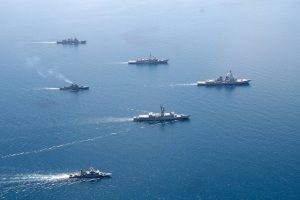Thailand is considering allowing its ally the United States to use its airports as a base for planes assisting in the ongoing migrant crisis in Southeast Asia.
The United States has asked Thailand for permission to use its airports — likely either Phuket or U-Tapao airports — as a temporary base for planes assigned to monitor the movement of thousands of migrants stranded in the sea. According to Thai foreign minister Tanasak Patimapragorn, Thailand is still considering the request and has asked the United States to provide more details about its proposed mission, since Bangkok has “to take national security into consideration.”
Tanasak did not spell out exactly what these national security considerations were. But the issue of basing has at times been a prickly one in U.S.-Thai relations. U-Tapao, a base used during the Vietnam War as well as during relief operations following the Indian Ocean tsunami in 2004 and after Cyclone Nargis in Myanmar in 2008, is a case in point. For example, in June 2012, NASA was forced to cancel a climate study because of Thailand’s failure to grant approval to use U-Tapao Airbase. A hodgepodge of rationales were cited by opponents of the plan in Thailand, including concerns about how China would perceive it, the threat to national sovereignty, and even worries about U.S. espionage activities. Washington had also wanted to use U-Tapao as a center for humanitarian research and rescue operations in the region.
That being said, despite these general sensitivities, temporary and limited requests by Washington have been granted before under this government in response to humanitarian crises. For example, just earlier this month, the Thai government allowed the United States to station 16 transport and aerial refueling aircraft for three weeks at U-Tapao airport as part of an earthquake relief operation in Nepal. The request was granted under the umbrella of a Thai-U.S. Humanitarian Assistance and Disaster Relief Combined Coordination Center for Nepal at the airport.
While the circumstances in this case are different, Tanasak did seem to suggest that the request could be approved if some of the specifics were worked out. He suggested that some additional details — including the flight routes of U.S. aircraft — would help assuage some of these “national security” concerns. And on sovereignty, he was also particularly firm on the fact that if the U.S. request is approved, the mission would have to come under the supervision of Thai authorities. Thailand’s junta chief Prayuth Chan-o-cha had also suggested earlier that while Washington was welcome to join in any humanitarian efforts, Thailand will “have to have sovereignty over both land and sea.”
Of course, the exact nature of both Thailand’s role in the migrant crisis and its coordination with the international community — including the United States — is itself evolving. Thailand is hosting a May 29 regional meeting on the crisis which is expected to provide additional clarity on these points.

































